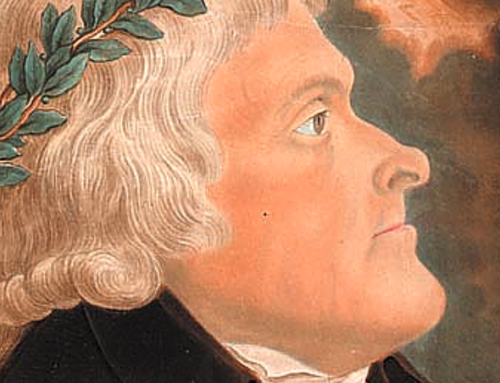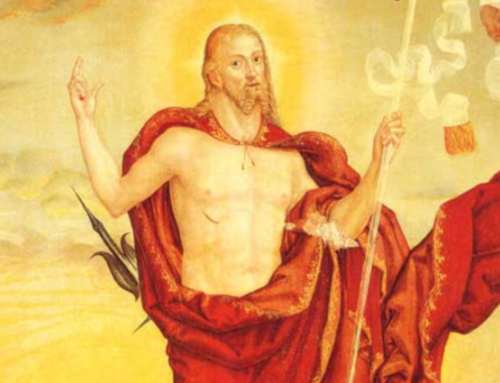 (This is the first essay in a series The Imaginative Conservative will be publishing in honor of the sixtieth anniversary of Russell Kirk’s The Conservative Mind.)
(This is the first essay in a series The Imaginative Conservative will be publishing in honor of the sixtieth anniversary of Russell Kirk’s The Conservative Mind.)
A vital date for those of us who read Winston Elliott’s The Imaginative Conservative is May 11, 2013, the sixtieth anniversary of the publication of Russell Kirk’s The Conservative Mind.
It’s easy to forget this was only Kirk’s second book. It could easily be a fine scholar’s last book, not his second! His first book, his revised M.A. thesis from Duke University, an intellectual biography of the eccentric John Randolph of Roanoke, had introduced the young Michiganian to the academic world with a bang. The reviews all praised Kirk’s biography of the Virginian, but this would prove as nothing compared to what was to come with the publication of The Conservative Mind.
As much to his surprise as to everyone else’s, The Conservative Mind turned the 35-year old into almost overnight media sensation and a bit of an intellectual celebrity in the English-speaking world.
Originally entitled The Conservative Rout, The Conservative Mind was Kirk’s dissertation, written under the kindly laissez-faire and gentlemanly guidance of Professor J.W. Williams, at the University of St. Andrews. And, by guidance, I mean nearly complete avoidance. Kirk noted in an interview toward the end of his life that he was unsure his advisor ever actually read anything. They met often for drinks and conversation, and Kirk noted that each chapter would be where he had last left it, only now adorned by the perfect rings of the glasses of not infrequent libations consumed by his advisor.
Arriving in Scotland just on the eve of his 30th birthday in 1948, Kirk had become something of an inveterate traveler. This began during his time in the military during World War II.
When he arrived in Scotland three years after the war (but only two years after his discharge), he took full advantage of the Old World.
These chapters have been written in a variety of places: in a but-and-ben snuggled under the cliffs of Eigg; in one of the ancient towers of Kellie Castle, looking out to the Forth; in my great-grandfather’s house in the stump-country of Michigan; among the bogs of Sligo in the west of Ireland; upon the steps of Ara Coeli, in Rome; at Balcarres House, where what Burke calls ‘the unbought grace of life’ still abides. A hundred people have helped me, and this book is an endeavor to aid in conserving the tradition which gives them their being.
As is clear from the words above, Kirk had desired for a long period of his early life to be a professional travel commentator and advisor/writer. Indeed, everywhere he went, he wrote and recorded in his letters and diaries astute observations on architecture and culture, peppered with hilarious personal anecdotes and encounters. Many of these observations saw their way into print in small journals and in book compilations, such as Beyond the Dreams of Avarice and Confessions of a Bohemian Tory.
That he visited the Ara Coeli is significant symbolically, as it was here that Edward Gibbons had envisioned much of his famous history of Rome and it was the same spot on which Christopher Dawson had claimed to receive a mystical vision from God in 1909: a brief but comprehensive view of world history, all in the span of a second. Dawson spent his entire professional and writing career trying to live up to this vision.
While Kirk claimed no prophetic insights while standing at the Ara Coeli, he certainly produced something of a Jeremiad mixed with a hagiography in the brilliant The Conservative Mind.
And, rightly so.
Certainly, there were a number of things “in the air” that allowed Kirk to make such a splash. Peter Viereck and Francis Graham Wilson had already published directly on conservatism. Burke and De Tocqueville were slowly being rediscovered in the chaos of the post-war world, and Christopher Dawson, Eric Voegelin, Leo Strauss, and other greats were arriving on the American scene.
But, Kirk. Kirk. Well, Kirk. He brought it all together, giving conservatives a coherent narrative, a history and a lineage, a noble heritage.
Kirk presented almost nothing about defense policy, economic policy, or educational policy. Instead, throughout the book, he created a list of conservative venerables, from Edmund Burke through George Santayana. In his definition of conservative, the poetic, literary, and theological superseded the political. As Kirk explained to Regnery in a personal letter in 1952, he did not think a writer or publisher should “exclude political essays.” Instead, he continued, the author and publisher should “recognize the greater importance, in literature as in life, of religion, ethics, and beauty.”
After the first reviews began to appear, Kirk grew frustrated with the political analysis and emphasis on The Conservative Mind. Not even the followers of Irving Babbitt had laid “stress enough upon the ethical aspect of” The Conservative Mind, he worried. “Politics, I never tire of saying, is the diversion of the quarter-educated, and I do try to transcend pure politics in my book.”
As Christopher Dawson argued repeatedly, the last great phase of literary writing appeared between the two world wars. With the advent of World War II, a war over rival, terrorist ideologies, the world had become narrower, less imaginative, and set on and in thinking politically and only politically.
Kirk’s attempt to put politics back in its proper sphere was, to say the least, admirable, but even he could not convince the innumerable advocates and reviewers of his work to follow him down a non-political path. Kirk gave them poetry, history, and philosophy, but they wanted cold, utilitarian social science.
The Conservative Mind is nothing short of astounding in its depth of thought and in its writing style.
Somewhat famously, Kirk posited six tenets of conservatism. Vitally, these were dogmatic assertions, never systematic proposals. At some points in his career, the author offered four or five points, sometimes as many as ten. He came back to the six, though worded in a variety of ways, time and time again.
- “Belief in the transcendent order, or body of natural law, which rules society as well as conscience”
- Affection for the proliferating variety and mystery of human existence, as opposed to the narrowing uniformity, egalitarianism, and utilitarian aims of most radical systems.”
- “Conviction that civilized society requires orders and classes, as against the notion of a ‘classless society.’”
- “Persuasion that freedom and property are closely linked: separate property from private possession, and Leviathan becomes master of all.”
- “Custom, convention, and old prescription are checks both upon man’s anarchic impulse and upon the innovator’s lust for power.”
- “Recognition that change may not be salutary reform: hasty innovation may be a devouring conflagration, rather than a torch of progress”
The Conservative Mind remains in print to this day, and it has offered an introduction of non-left thought to many generations of readers. Kirk revised the book six times, and the final, revised, seventh edition, appeared in the summer of 1986. Though Kirk did not pass away until the spring of 1994, he had correctly presumed that the seventh edition would be the last.
The first revised edition, officially the second edition printed simultaneously by Henry Regnery in Chicago and T.S. Eliot through Faber and Faber in London, appeared in 1954. As with all future revised editions, the 1954 version offered a much more nuanced view of conservatism itself while dramatically narrowing the author’s original acceptance of libertarianism and its respective publications.
By the third revised edition, published in 1960, persons such as Eric Voegelin, Robert Nisbet, and G.K. Chesterton replaced Albert Jay Nock and Isabel Paterson.
Because of its sheer longevity, The Conservative Mind in and of itself presents an autobiographical and living, growing view of conservatism, edition to edition. With the various editions, one can readily trace Kirk’s own adaptation and evolution of ideas and influences from 1953 to 1986. One can simultaneously see how Kirk’s book might have proved shocking in 1953 but mainstream or even somewhat commonplace and tame by the Reagan era.
Reading Kirk’s magisterial is a liberal education in and of itself. It is a celebration of the Transcendent, of time, of eternity, of humanity, of civilization, of goodness, of beauty, and of truth.
Books on the topic of this essay may be found in The Imaginative Conservative Bookstore.







Enjoyed your tribute Bradley. And learned a bit more about Kirk as well. Can’t wait for your upcoming book!